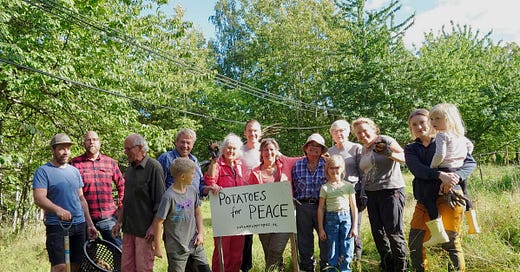On this Reality Roundtable, philosopher/writer Dougald Hine, social scientist/farmer Chris Smaje, and ecologist/farmer Pella Thiel join me to discuss the future of food and community. Our disconnected relationship to agriculture and our neighbors have been shaped by a modern industrial society fueled by surplus hydrocarbon energy. What will these relationships look like in a lower energy future, where we need to once again work with each other and the land, rather than in isolation.
Dougald Hine is a social thinker, writer and speaker. After an early career as a BBC journalist, he co-founded organizations including the Dark Mountain Project and a school called HOME. His latest book is At Work in the Ruins: Finding Our Place in the Time of Science, Climate Change, Pandemics & All the Other Emergencies (2023). He co-hosts The Great Humbling podcast and publishes a Substack called Writing Home.
'Chris Smaje is a writer, social scientist and small-scale farmer, co-running a mixed holding in Somerset, southwest England. He's the author of A Small Farm Future (2020) and Saying NO to a Farm-Free Future (2023), both published by Chelsea Green. He blogs at and is contactable via www.chrissmaje.com.'
Pella Thiel is a maverick ecologist, part-time farmer, full-time activist and teacher in ecopsychology. She is the co-founder of swedish hubs of international networks like Swedish Transition Network and End Ecocide Sweden and a knowledge expert in the UN Harmony with Nature programme. Pella was awarded the swedish Martin Luther King Award in 2023 and the Environmental Hero of the year 2019.
Can we learn from history to celebrate with each other in times of abundance and find strength in community in times of need? In the present world where people are in constant search for meaning and purpose, what are strategies to find joy in simplicity and well-being through the growing and sharing of food?
In case you missed it…
This past Friday, I gave a short reflection on the recent events in the Middle East and how they could lead to a shortening of the timeline to The Great Simplification. For those fortunate to live outside the direct impacts of these conflicts, many - like me - feel pressure to stay informed about our turbulent, rapidly evolving global landscape. Yet my biggest insight this week wasn’t about Israel or Iran or oil, but the recognition we need (and will continue to need) to balance everyday tasks and chores that keep our lives going as we ‘watch the storm’.
If you appreciate The Great Simplification podcast…
Be sure to leave a review on your preferred podcast platform! Leaving reviews helps the podcast grow, which helps spread awareness of our systemic situation from experts in ecology, energy, policy, economics, technology, and community building so that we can better understand - and respond to - the challenges of the coming decade.
The Great Simplification podcast is produced by The Institute for the Study of Energy and Our Future (ISEOF), a 501(c)(3) organization. We want to keep all content completely free to view globally and without ads. If you’d like to support ISEOF and it’s content via donation, please use the link below.





